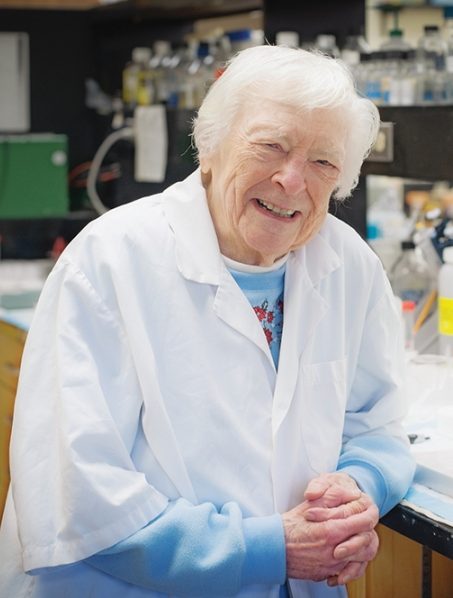

Dear Colleagues,
With great sadness, we share the news that Professor Emerita Dr. Edith (Edie) McGeer passed away on Monday August 28, 2023 at the age of 99. As a pioneering researcher who made seminal contributions to our understanding of the biochemical pathology of Alzheimer’s and other neurodegenerative diseases, Dr. McGeer leaves behind a legacy of extraordinary achievement and impact in the field. Her passing is a profound loss to the international neuroscience community.
Early in life, Dr. McGeer proved to be a gifted student who excelled in both mathematics and the sciences at a time when women were not encouraged to pursue careers in these male-dominated fields. She went on to complete her Bachelor’s degree in Chemistry at Swarthmore College in 1944, and then notably obtained her PhD in Organic Chemistry within two years at the University of Virginia. From 1946 to 1954, Dr. McGeer worked as a Research Chemist for the DuPont Company in Wilmington, Delaware, and during this time, she suggested a route to synthesizing tetracyanoethylene which opened the way to a new branch of organic chemistry, leading to three patents and a citation from the Delaware section of the American Chemical Society.
In 1954 Dr. McGeer moved to Vancouver with her spouse and lifelong collaborator, the late preeminent neuroscientist Dr. Patrick McGeer, and joined the neurochemistry lab led by Dr. Bill Gibson in the UBC Department of Psychiatry. This transition marked the start of her prolific and highly distinguished academic career which spanned over six decades. She was among the founding members of the UBC Division of Neuroscience, serving as both Acting Head and Head of the Division from 1976 to 1989, as well as serving as Director of the Kinsmen Laboratory of Neurological Research. A brilliant and visionary scientist, Dr. McGeer achieved many notable ‘firsts’ alongside Patrick, which included introducing the concept of using neurotransmitter synthetic enzymes as markers for biochemical neuroanatomy and biochemical pathology, and pioneering the concept of neuroinflammation as a contributor to neurodegeneration, particularly in Alzheimer’s disease. She also held a total of ten patents, published an astonishing 525 peer-reviewed manuscripts, and authored the first edition of the Molecular Biology of the Mammalian Brain with her husband and Nobel laureate Sir John Eccles. She remained one of the top 100 most highly cited neuroscientists in the world and a global role model for women scientists.
In spite of her formal ‘retirement’ in 1989, Dr. McGeer continued to secure grant funding to continue her research activities, and for many years thereafter maintained a high level of productivity. Notably, in 2012 she and Patrick founded Aurin Biotech, a company dedicated to the development of novel agents to fill the need for safe, effective and orally available therapeutics for Alzheimer’s disease. In apt recognition of her esteemed career and accomplishments, Dr. McGeer received an array of prestigious honours, including a UBC Faculty of Medicine Lifetime Achievement Award, three honorary degrees, and induction as a Fellow to the Royal Society of Canada and as an Officer to the Order of Canada.
As we relay this news of Dr. Edie McGeer, who was predeceased by Patrick almost exactly one year ago in 2022, we celebrate her remarkable life and legacy while also sharing in the deep loss felt across our entire UBC neuroscience community and her expansive network of colleagues and friends around the world. On behalf of the UBC Department of Psychiatry, we express our heartfelt condolences to Edie’s children and the rest of the McGeer family during this most difficult time.
Sincerely, on behalf of Department Head Dr. Lakshmi N. Yatham,
Dr. Raymond W. Lam
Professor and Associate Head, UBC Department of Psychiatry
Co-Director, Mood Disorders Centre, Djavad Mowafaghian Centre for Brain Health
Executive Chair, APEC Digital Hub for Mental Health
Dr. Lynn A. Raymond
Director, Djavad Mowafaghian Centre for Brain Health
Louise A. Brown Chair in Neuroscience
Professor, Department of Psychiatry
Co-Director, Centre for Huntington Disease
The UBC Department of Psychiatry Administration Office respectfully acknowledges the land on which we live, work and play is the traditional, ancestral, and unceded territories of the Coast Salish Peoples, the xʷməθkʷəy̓əm (Musqueam), Skwxwú7mesh (Squamish), and Səlilwətaɬ (Tsleil-waututh).





